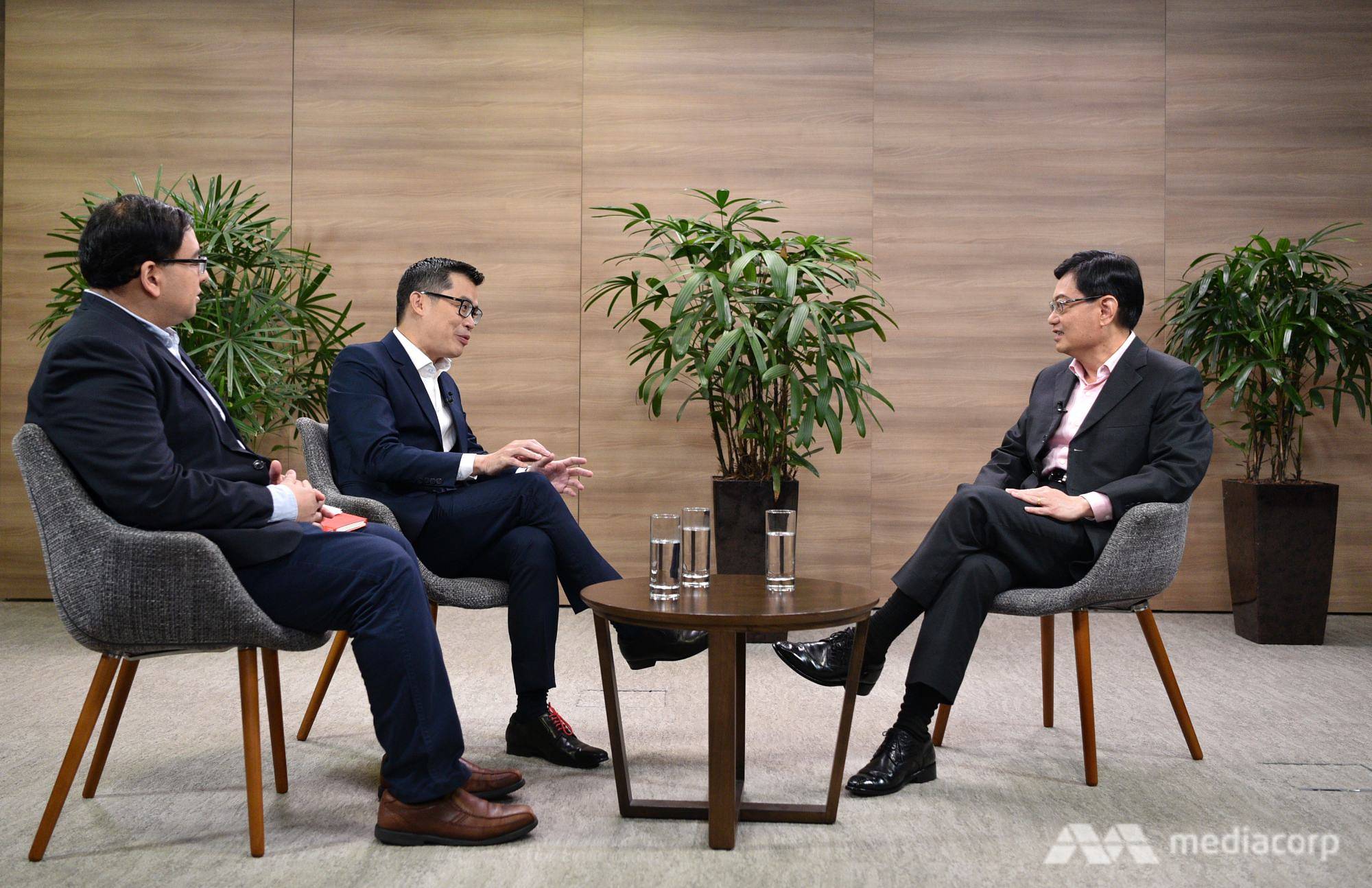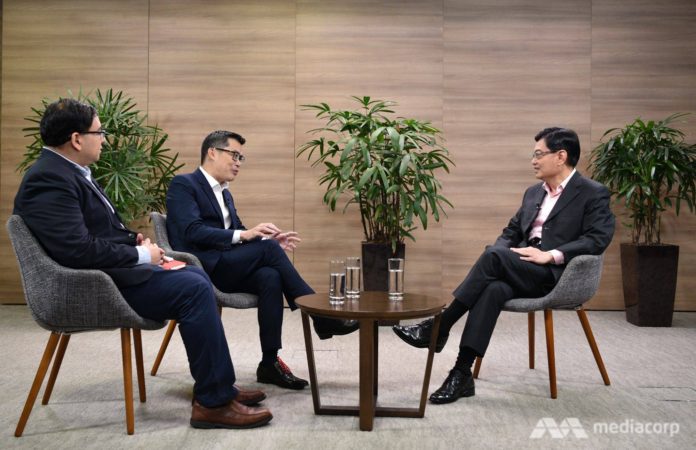SINGAPORE: The biggest “unknown” challenge that Singapore will face in the future is the “nature of politics”, said recently appointed Deputy Prime Minister Heng Swee Keat, in an interview with CNA and The Straits Times.
READ: Heng Swee Keat to be promoted to DPM in Cabinet reshuffle
Mr Heng, in his first media interview in his new capacity, said that Singapore has had “very constructive politics” for the past 50 years and more, and this has helped keep society cohesive and united. It has been able to achieve consensus on a large number of short-term, as well as long-term issues, and that has allowed Singapore to make really good progress, he said.
“Now, will we continue on that journey? I think that depends, critically, on the nature of politics in Singapore,” he said, in response to a question on what “known unknown” challenges the country might have to prepare for.
“How are we able to mobilise all Singaporeans to take part in this process and, at the same time, to keep politics constructive, forward-looking … so we can tackle the many challenges, many interesting opportunities ahead.”

The Straits Times news editor Zakir Hussain and CNA Digital chief editor Jaime Ho interview DPM Heng Swee Keat at the National Press Centre. (Photo: Jeremy Long)
Mr Heng, whom many expect to be the country’s next Prime Minister, pointed out that he and his other fourth-generation (4G) leaders of the People’s Action Party (PAP) are prepared and working towards a “normative scenario” to keep politics in Singapore constructive and the country cohesive and united.
This comes against an international backdrop where fragmenting societies and political polarisation are becoming serious problem, he said. Mr Heng, who remains Finance Minister, recounted his trips to Davos, Switzerland, and more recently to the United States, where he had many discussions with leaders from various parts of society on the changing nature of societies, whether it is in Europe, US or Asia.
“(What) everyone is very alarmed by is the speed at which society is fragmenting into parts. So, many societies cannot have the political consensus to do the right thing,” he said. “And even more worrying is that many societies do not take painful measures which are necessary for the long term.
“Everyone promises that things will be easier, better and sometimes to the point of telling untruths. I think that is not the kind of politics we should have in Singapore.”
Instead, Singapore must be prepared to face realities, even if these are harsh.
“(We have) to face it squarely and say: ‘Well look, how do we go about resolving this, and how do we create a better life, despite these constraints, despite these problems’,” he said.
MAKING HARD DECISIONS
To this end, Mr Heng said the Government has already had to make hard decisions.
READ: ‘Hard choices’ need to be made to keep healthcare spending sustainable, says PM Lee
One example of this is how to take better care of Singapore’s seniors even as the population ages, the Deputy Prime Minister pointed out.
“We’re going to have a very significant challenge in dealing with an aging population … but the key is we must be able to set aside resources and plan ahead to build facilities to manage this.”
He said Health Minister Gan Kim Yong is spending significant time thinking about how to restructure healthcare schemes and to enable more seniors to age at home. In turn, this creates other issues to tackle, such as how existing housing programmes can accommodate this and how ministries like the Ministry of Social and Family Development and Ministry of Health will reconfigure community networks to care for the elderly, he elaborated.
READ: Budget 2018 – GST in Singapore to be raised to 9% between 2021 and 2025
These all require significant amounts of resources, Mr Heng said, also making reference to the Government’s decision to raise the Goods and Services Tax (GST), which was announced in 2018’s Budget.
Mr Heng most recently defended the decision to raise GST in Parliament in February this year, as Members of Parliament voiced their concerns and suggested the increase could be delayed.
MORE VOICES DOESN’T MEAN MORE POLITICAL PARTIES
Responding to a question on the desire among younger Singaporeans to have more alternative voices in Parliament and for there to be a bigger role for civil society to play going forward, Mr Heng said he “understands” why they may feel that way.
Young Singaporeans who are exposed to articles and magazines in the West think that there ought to be a certain brand of democracy and that democracy should have two political parties, and one party that has been in power for many years is “not a good thing”, he said.
However, he suggested that they look at the evidence and what is happening in the world today.
Mr Heng juxtaposed how as Singapore commemorates its Bicentennial in 2019, the United Kingdom itself is currently locked in “contentious debate” over the issue of Britain’s exit from the European Union.
“I spoke to so many of our colleagues from the UK and they are really quite dismayed at how the political process has turned out. If you look at the debates, the two-party system – actually it’s more than two parties now – the fragmentation is very serious,” he said.
For Singapore, Mr Heng said the question should be how to include the views of as many people as possible in the governance process. It is “not a given” that having an opposition party, or having multiple parties, will “result in the best outcome for our society”, he said.
“So the question is this: As our society becomes more diverse, as our people are better educated, better exposed all round the world, how do we harness the energies of everyone in a constructive way and to take Singapore forward? Rather than spend time scoring political points, debating for the sake of debating,” said the Deputy Prime Minister.
“The world is moving really quickly and I think it’s important for us to understand the pace of change, the complexity of change, and for us to say: ‘Well, look, given these, how can you and I come together and agree to do X, Y or Z in order to take Singapore forward?’
“And it’s not just the leaders agreeing to do X, Y or Z, but it is that we have to mobilise our people at every level to say: ‘Yes we agree, we support this’ because at the end of it, that will give us a better life.’”
The full interview with DPM Heng Swee Keat will be broadcast tonight (Sunday, May 5) at 8.30pm on CNA.





